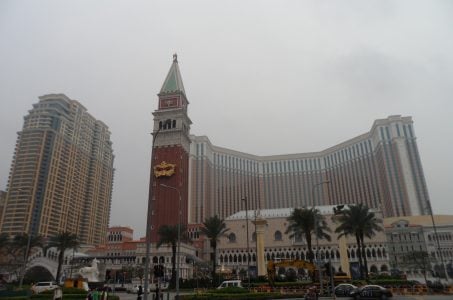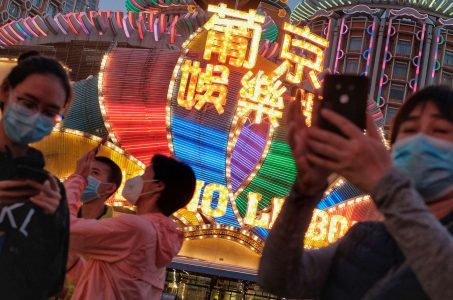Sands Primary Markets Won’t Return to Pre-Pandemic Levels Until 2023-24, Says Fitch
Posted on: September 9, 2021, 10:09h.
Last updated on: September 9, 2021, 11:05h.
Las Vegas Sands (NYSE:LVS) maintains an investment-grade credit rating from Fitch Ratings. But the research firm has a negative outlook on that grade, noting it will take time for the operator’s marquee gaming markets to rebound.

In a recent note, Fitch reiterates a “BBB-” rating with a negative outlook on the casino giant, reflecting the ratings agency’s new, downwardly revised projections for Macau and Singapore — the two markets in which Sands owns integrated resorts.
Fitch forecasts Macau’s gaming revenues to be nearly 65% below 2019 levels in 2021, recovering to 35% below 2019 by 2022, and fully recovering in 2024,” said the research firm. “Fitch assumes a slightly faster trajectory for Singapore, which has a high vaccination rate, benefits from strong domestic demand, and is starting to open up quarantine-free travel with certain high-vaccinated countries.”
Amid lingering travel controls and a recent uptick in coronavirus cases on mainland China, recovery in Macau is moving in fits and starts. Las Vegas Sands controls five gaming venues in the world’s largest casino center, and often relies on that market for approximately three-quarters or more of quarterly revenue and earnings before interest, taxes, depreciation and amortization (EBITDA).
LVS Not Staring at Debt Downgrade
While Sands’ credit grade is one notch above junk territory and the negative outlook isn’t aesthetically appealing, Fitch says the Venetian Macau operator isn’t imminent danger of a downgrade.
Owing to the company’s efforts over the past 18 months to reduce debt and shore up its credit profile, the probability of downgrade is declining. Those moves include the April 2020 suspension of its dividends, expanding its borrowing capacity in Macau, and pushing out some plans at Marina Bay Sands (MBS) in Singapore.
The emphasis on a sturdy credit profile is important for multiple reasons. That includes the fact that Sands China said earlier today it’s selling dollar-denominated senior unsecured notes to pay off $1.8 billion in debt coming due in 2023.
“Fitch forecasts LVS to achieve the 3.5x net leverage metrics by 2022, and approach Fitch’s 4.0x gross leverage sensitivity by 2023 (4.2x forecast). LVS’ solid net leverage profile is supported by the company’s decision to halt shareholder returns in the beginning of the pandemic,” according to the research firm.
When the dividend was suspended, it was $3.16 per share annually and yielded 6.88 percent. Based on its 742.82 million shares outstanding and its annual payout of $3.16 a share, Sands saves $2.34 billion every year it doesn’t deliver the old dividend.
Las Vegas Question Remains
In March, LVS announced the sale of Venetian, Palazzo and Sands Expo and Convention Center on the Las Vegas Strip for $6.25 billion. The influx of that cash is certainly a positive. But Fitch says lack of clarity surrounding the operator’s plans for that capital needs to be resolved.
“The Negative Outlook also considers uncertainty surrounding the ultimate use of the Las Vegas asset sale proceeds, although a revision to Stable would not necessarily hinge on LVS providing a more specific use of proceeds,” said the research firm.
It’s clear the proceeds from that transaction won’t go to dividend resumption. At least not anytime soon. Under the terms of a new agreement with creditors, LVS can’t restart its payout prior to the end of 2022 unless certain liquidity criteria are met.
Fitch estimates the gaming company won’t restart shareholder rewards programs until 2023, and “their payout relative to cash flow is consistent with pre-pandemic levels.”
Related News Articles
Sands Earns ‘Buy’ Rating as Analyst Sees Trough for Rough Macau Estimates
Macau GGR Decline Slows as Mainlanders Continue to Return
MGM Japan Casino Spend Could Be $2.5B, Says S&P
Most Popular
Las Vegas Overstated F1 Race’s Vegas Impact — Report
Vegas Strip Clubs Wrestle in Court Over Animal Names
Mega Millions Reportedly Mulling Substantial Ticket Price Increase
Las Vegas Strip Stabbing Near The Strat Leaves One Man Dead
Most Commented
-
End of the Line for Las Vegas Monorail
— April 5, 2024 — 90 Comments -
Mega Millions Reportedly Mulling Substantial Ticket Price Increase
— April 16, 2024 — 6 Comments -
Long Island Casino Opponents Love New York Licensing Delays
— March 27, 2024 — 5 Comments -
VEGAS MYTHS RE-BUSTED: You Can Buy Legal Weed On the Strip
— March 22, 2024 — 4 Comments
















No comments yet